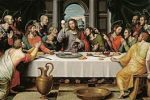Is the Eucharist Cannibalism?

Miriam-Webster defines cannibalism as:
1. The usually ritualistic eating of human flesh by a human being.
2. The eating of the flesh of an animal by another animal of the same kind.
Cannibalism implies the actual chewing, swallowing, and metabolizing of flesh and blood either after or during the killing of an animal of the same species; or, if we stick to definition #1, the killing and eating of a human being by another human being.
Catholics do not do any of this in the Eucharist. Though Christ is substantially present—body, blood, soul and divinity—in the Eucharist, the accidents of bread and wine remain. Here it becomes essential to define terms. When the Church teaches the bread and wine at Mass are transubstantiated into the body, blood, soul and divinity of Christ, we have to understand what this means. The word, transubstantiation, literally means “transformation of the substance.” “Substance” refers to that which makes a thing essentially what it is. Thus, “substance” and “essence” are synonyms. For example, man is essentially comprised of body, soul, intellect, and will. If you remove any one of these, he is no longer a human person. The accidents or accidentals would be things like hair color, eye color, size, weight, etc. One can change any of these and there would be no change in the essence or substance of the person.
In the Eucharist, after the priest consecrates the bread and wine and they are, in fact, transubstantiated into the body, blood, soul and divinity of our Lord, our Lord is then entirely present. Neither bread nor wine remains. However, the accidents of bread and wine (size, weight, taste, texture) do remain. Hence, the essential reason why Catholics are not guilty of cannibalism is the fact that we do not receive our Lord in a cannibalistic form. We receive him in the form of bread and wine. The two are essentially different.
To dive a bit deeper into this, I would suggest there are at least six reasons why the Eucharist and cannibalism are difference as a matter of essence.
1. In cannibalism, the person consumed is, generally speaking, killed. Jesus is not killed. We receive him in his resurrected body and we do not affect him in the least. In fact, he is not changed in the slightest. He changes us! This is far from cannibalism.
2. In cannibalism, only part of the victim is consumed. One does not eat the bones, sinews, etc. In the Eucharist, we consume every bit of the Lord, eyes, hair, blood, bones, etc. But again, I emphasize that we do so under the appearances of bread and wine. This is essentially different than cannibalism, which leads to our next point:
3. In cannibalism, the accidents of blood and flesh are consumed. One must tear flesh, drink blood, etc. In the Eucharist, we only consume the accidents of bread and wine. This is not cannibalism.
4. In cannibalism, one only consumes a body, not a person. The person and the soul of the victim would have departed. In the Eucharist, we consume the entire person of Jesus Christ, body, blood, soul and divinity. One cannot separate Christ’s body from his Divine Person. Thus, this is a spiritual communion as well as a physical consuming. We become one with Christ on a mystical level in this sacrament. This is far from cannibalism.
5. In cannibalism, one only receives temporal nourishment that is fleeting. In the Eucharist, we receive the divine life of God through faith and receiving our Lord well-disposed, i.e. we receive everlasting life (cf. John 6:52-55). This is essentially different than cannibalism.
6. In cannibalism, once one eats the flesh of the victim, it is gone forever. In the Eucharist, we can consume him every day and, as mentioned in #1, we do not change him one bit. He remains the same.
Final Thoughts
One always has to be careful when applying terms and concepts to God. Many people miss the mark with regard to the faith because they make the mistake of applying terms in a human way to God who is infinite. We could speak of Mormons who claim God, the Father, has a physical body because the Scriptures speak of God’s “back parts,” in Exodus, or “the hand of Lord,” the “eyes of the Lord,” etc. You’ve probably heard the classic rejoinder to these Mormon claims: “Psalm 91 refers to God’s ‘feathers and wings’. Does this mean God is some sort of bird?”
The error here, of course, is rooted in interpreting texts that were not intended to be used in a strict, literal sense, as if they were. “Back parts” have to mean “back parts,” right?
When it comes to the Trinity, some who deny this essential teaching will claim Christians are teaching God to be “three beings” because we say God is “three persons.” However, person, as it relates to God, does not mean there are three beings. There is an essential difference between “person” as it relates to God, and “person” as it relates to men and angels.
We could cite a litany of examples containing similar problems.
When it gets down to brass tacks, the nay-sayers who reject the Eucharist, and most specifically, those who accuse us Catholics of cannibalism because we say we “consume” the Lord in the Eucharist, body, blood, soul, and divinity, fail to understand what we actually mean by consuming the Lord. They end up objecting just as the unbelieving “Jews” of John 6:52, who said, “How can this man give us his flesh to eat?”
If you are thinking about a cannibalistic blood-meal, he can’t. But if you understand, as Jesus said, “It is the Spirit that gives life, the flesh is of no avail, the words I have spoken to you are Spirit and life,” then you understand. The Eucharist represents a miracle confected by the power of the Holy Spirit.
God can do that.
If you liked this, and you want to go deeper, click here.






